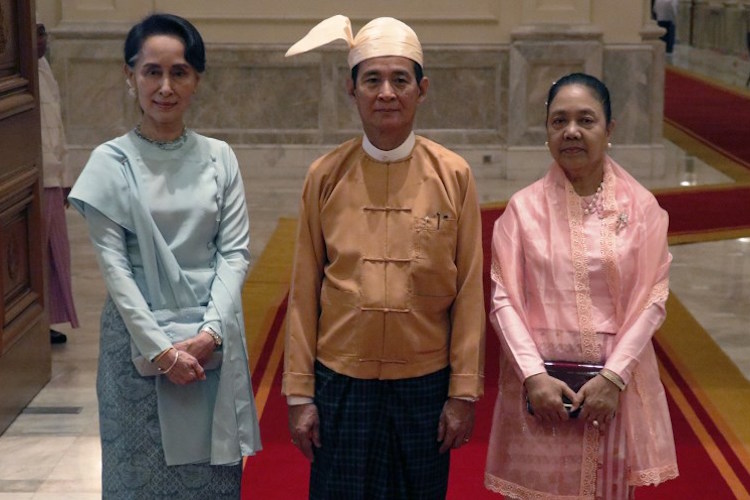Changing president and speaker are a start but she must do more with the economy and for minorities to hang onto power

Newly sworn in Myanmar President Win Myint (C), State Counsellor Aung San Suu Kyi and First Lady Cho Cho pose for a picture after an oath taking ceremony in the parliament in Naypyidaw on March 30. (Photo by Sai Zaw /AFP)
April 9, 2018
The shake up to Myanmar’s parliament with the election by the nation’s parliament of new President Win Mynt and Speaker T Khun Myat almost exactly half way between the 2015 and 2020 elections appears to be the ideal chance for Aung San Suu Kyi to refresh her government mired in the Rohingya crisis and a sagging economy.
The changes are more substantial than they first look to outside observers but the chances that the Rohingya refugees may benefit are slim.
First up, Win Mynt is not expected to be nearly as passive as his predecessor Win Kyaw who, as his wife has admitted, had never planned to be in the job for the long haul. He was, using common parlance, a puppet of Suu Kyi who is constitutionally barred from the presidency because she married a British citizen and her two sons are British. Eventually ill health caught up with Win Kyaw — he has had several trips to Singapore for medical reasons — and the National League for Democracy (NLD) that Suu Kyi heads and which has an overwhelming majority in parliament has been considering a replacement since late last year.
Win Mynt is considered to be a man of his own, he has proven to be a very active speaker of the Lower House — a powerful position in the nation’s parliament — so is expected to less likely to be that kind of person.
Like many NLD officials he has done time in jail, three relatively short stints — although conditions in Myanmar’s prisons are harsh — and has no love for the army which he has said he believed should withdraw from ethnic areas.
Still, the army remains, in effect, the ultimate power in the country. It has maintained control of the defense, home affairs (including budget administration and police) as well as border portfolios, again under the constitution inked in 2008 by the military as they prepared the nation for opening up and reform.
So, the army would have had to sign off on his appointment and many observers see this as a tradeoff — the reason that T Khun Myat, an independent lawmaker was named as speaker. Not a member of the NLD, but aligned with former speaker Shwe Mann who continues to be reported as a close adviser to Suu Kyi. T Khun Myat was was previously elected under the banner of the military backed Union Solidarity Democracy Party (USDP) that all the representatives of the military block are members of, including those holding the 25 percent of all seats reserved for the military in all Myanmar’s national and states parliaments.
Suu Kyi needs help
But it is now clear that Suu Kyi, 72, needs help. Her punishing schedule has battered her health somewhat. During her recent trip to the summit between Australia and the Association of South East Asian Nations she cut short her time at a private meeting of the Myanmar diaspora in Canberra and pulled out of a major speech at Sydney’s Lowy Institute foreign affairs think tank. Informed sources say that she was certainly unwell and not dodging the media.
Health aside, she has also been stuck in first gear on reforming and improving Myanmar’s economy, preferring to focus on her ambition of national peace accord through the resuscitation of the Panlong Peace process begun in 1948 by her father Aung San who was killed during his first year as head of the newly independent country. But with the military still in effective control of security in the seven-ethnic states — the ongoing civil war in Kachin State and the military instigated Rohingya tragedy show the harsh reality of the situation, Suu Kyi, though her efforts are admirable, appears to be tilting at windmills without constitutional reform.
But Suu Kyi still appears strangely oblivious or impervious, or both, to the human tragedy scale and damage the Rohingya crisis has caused her internationally; it may also be chipping away at her popularity in the ethnic states, (are we next?) although the large rump of support in the center largely supports the vile actions of the military. And it is highly unlikely her new team will change this.
One concrete thing the new president and speaker can do is to restore some respect for parliament both inside and out. People familiar with the goings on in the capital Naypyidaw say that local members are now far less focused on representing their constituents than the inside-beltway-dramas of the isolated capital.
This needs to change for the NLD out of necessity as much as ethically. Beaten by the NLD in their own backyard in the 2015, the once fractured ethnic based state parties are keen not to repeat those mistakes. Recently three parties in Chin State merged, following the lead of parties in Kachin State last year, due to a lack of progress in peace initiatives and little or no apparent economic development — 65 percent of the country remains unconnected to the electricity grid, for instance.
There have been rumors swirling that Suu Kyii’s next step will be to clean out underperforming cabinet ministers although the parliamentary bench remains inexperienced and relatively underwhelming. As well, Suu Kyi’s; renowned autocracy inside the party is beginning to look self-defeating so what role she allows Win Myat to play will be extremely telling.
Whatever the case, move she must or her prospects of hanging onto power in 2020 will look increasingly shaky.
